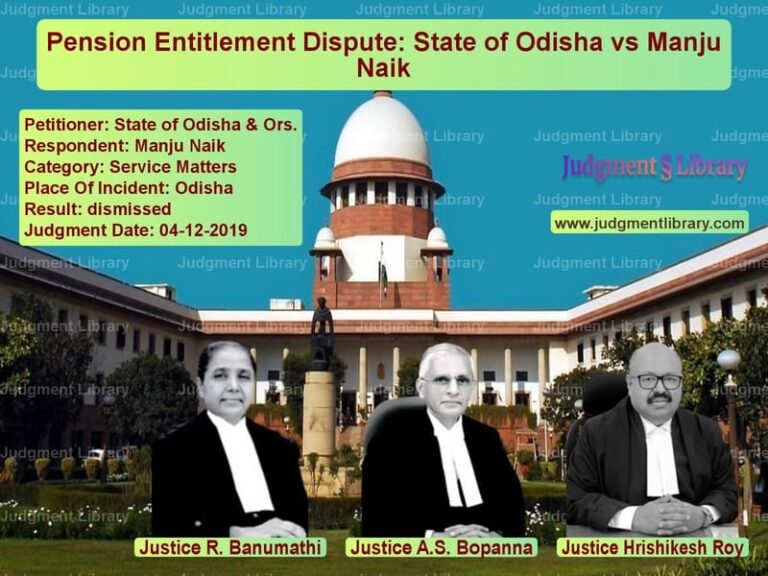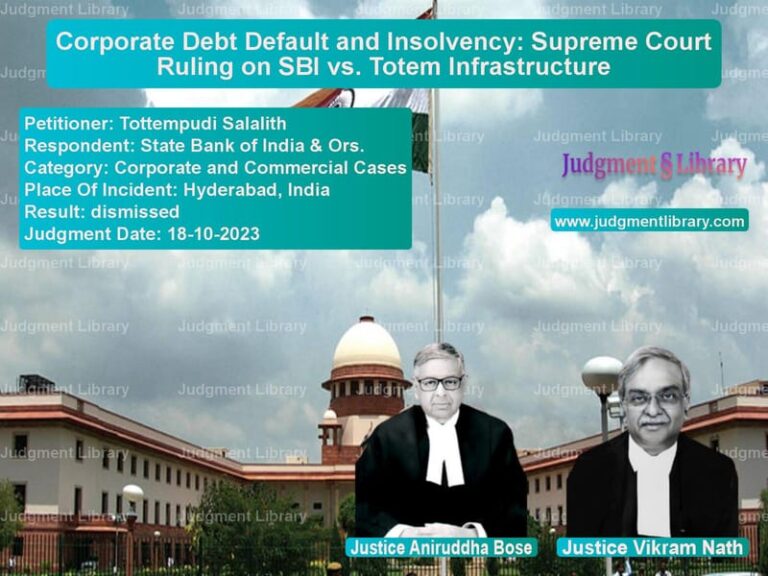Supreme Court Dismisses Plea for Investigation into Alleged Corruption in Birla and Sahara Groups
The Supreme Court of India recently delivered a significant judgment in Writ Petition (Civil) No. 505 of 2015, filed by Common Cause (A Registered Society) against the Union of India. The case revolved around allegations of corruption involving top political figures and corporate entities, including the Aditya Birla and Sahara Groups. The petition sought an independent probe into incriminating documents allegedly seized during raids conducted by the Income Tax Department and the Central Bureau of Investigation (CBI).
The petitioners argued that the documents, which included purported records of cash transactions, pointed to high-level corruption and warranted an investigation by a Special Investigation Team (SIT). They contended that the authorities had failed to act on substantial evidence implicating influential political figures.
Background of the Case
The case originated from two high-profile raids:
- On October 15, 2013, the CBI conducted a raid at Aditya Birla Group offices across four cities, seizing documents and unaccounted cash worth Rs. 25 crores.
- The next day, the Income Tax Department also conducted raids on Aditya Birla Group premises, further seizing records and cash.
- On November 22, 2014, the Income Tax Department raided Sahara India offices in Delhi and Noida, uncovering Rs. 135 crores in unaccounted cash and documents detailing alleged cash payments to politicians.
Petitioners’ Allegations
The petitioners presented:
- Printouts from a seized laptop allegedly indicating payments to political figures.
- Handwritten documents showing over Rs. 115 crores in cash transactions.
- Entries suggesting payments to various high-ranking officials.
- Allegations that the CBI and other agencies deliberately avoided investigating these documents.
Arguments of the Petitioners
Senior counsels Shanti Bhushan and Prashant Bhushan, representing the petitioners, argued that:
- The documents presented were sufficient to order a preliminary investigation.
- The credibility of constitutional functionaries should not prevent an investigation into corruption allegations.
- The Supreme Court, as the country’s highest judicial authority, had a duty to ensure a fair and impartial probe.
Government’s Response
The Attorney General of India, Mukul Rohatgi, and Additional Solicitor General Tushar Mehta opposed the petition, arguing that:
- The documents were loose papers, random sheets, and unverified computer records with no evidentiary value.
- The Income Tax Settlement Commission had already reviewed the materials and found them unreliable.
- Ordering an investigation based on such documents could set a dangerous precedent, allowing anyone to fabricate records against high-ranking officials.
Supreme Court’s Decision
The Supreme Court, in its ruling, dismissed the plea for an investigation. The bench, comprising Justice Arun Mishra and Justice Amitava Roy, held that:
- The documents relied upon by the petitioners were not admissible evidence under the Indian Evidence Act.
- Loose sheets, computer printouts, and unverified records could not form the basis of a criminal investigation.
- The CBI vs. V.C. Shukla precedent established that diary entries and loose sheets had no legal evidentiary value.
- The Income Tax Settlement Commission had already determined that the seized documents were unreliable and could not be used for prosecution.
The court further ruled:
“We are constrained to observe that the Court has to be on guard while ordering an investigation against any important constitutional functionary, officers, or any person in the absence of legally cognizable material.”
Key Takeaways
- The Supreme Court emphasized that an investigation cannot be ordered based on unreliable materials.
- It reiterated that loose sheets and unverified records do not constitute valid evidence.
- The decision reaffirmed legal principles established in the CBI vs. V.C. Shukla case.
- The court highlighted the importance of due process before ordering an inquiry into alleged corruption.
Conclusion
The Supreme Court’s judgment in this case reaffirmed the necessity of solid and admissible evidence before initiating criminal investigations. While the case raised significant questions about political corruption, the court ruled that mere diary entries and loose records were insufficient to trigger a probe. This decision sets a precedent in ensuring that investigative actions must be backed by legally credible materials, protecting individuals from baseless accusations.
Don’t miss out on the full details! Download the complete judgment in PDF format below and gain valuable insights instantly!
Download Judgment: Common Cause (A Regi vs Union of India Supreme Court of India Judgment Dated 11-01-2017.pdf
Direct Downlaod Judgment: Direct downlaod this Judgment
See all petitions in Public Interest Litigation
See all petitions in Judgment by Arun Mishra
See all petitions in Judgment by Amitava Roy
See all petitions in dismissed
See all petitions in supreme court of India judgments January 2017
See all petitions in 2017 judgments
See all posts in Constitutional Cases Category
See all allowed petitions in Constitutional Cases Category
See all Dismissed petitions in Constitutional Cases Category
See all partially allowed petitions in Constitutional Cases Category







